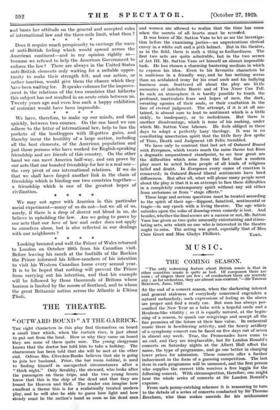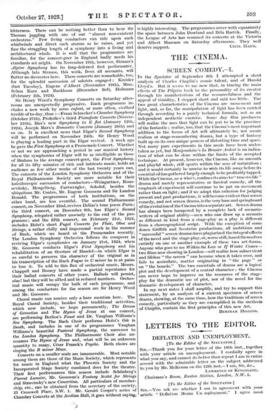MUSIC.
THE COMING SEASON.
" The only redeeming feature about British music is that in other countries music is quite as bad. Of composers there are none ; of singers there are few ; of conductors there are scarcely any ; as for orchestras, they are almost non-existent."--Sir THOMAS BEECHAM, June, 1923.
AT the end of a concert season, when the slackening interest and general staleness of everybody concerned engenders a natural melancholy, such expressions of feeling as the above are proper and find a ready ear. But man has always per-
sonified the New Year as a babe with a hopeful smile and a Reuben-like vitality ; so it is equally natural, at the begin- ning of a season, to quash our misgivings and accept all the fine promises of the future at their face value. In orchestral music there is bewildering activity, and the heavy artillery of a symphony concert can-be faced on five days out of seven in almost any week. True, the Promenades have come to an end, and they are irreplaceable, but Sir Landon Ronald's concerts on Saturday nights at the Albert Hall affect the name, the type of programme, and go one better in charging lower prices for admission. These concerts offer a further inducement in the form of a guessing competition. The last item in each programme will be unnamed, and the first person who supplies the correct title receives a free loggia for the following concert. With circumspection, therefore, one might hear the whole series of concerts at Sir Landon Ronald's expense.
From such penny-catching schemes it is reassuring to turn to the details of a series of concerts conducted by Sir Thomas Beecham, who thus makes amends for his midsummer bitterness. There can be nothing better than to hear Sir is highly interesting. The programmes cover with equanimity Thomas juggling with one of our " almost non-existent the space between John Dowland and Bela BartOk. Finally, orchestras." Few living conductors can ride upon such the League of Arts has resumed its concerts at the Victoria whirlwinds and direct such storms as he raises, and yet and Albert Museum on Saturday afternoons. They well fuse the straggling length of a symphony into a living and deserve support. Cum 1L4NN. architectural whole. It is well that the programmes are familiar, for the concert-goer in England badly needs his THE CINEMA' standards set aright. On November 19th, however, Strauss's Alpine Symphony has its long-deferred first performance.
Although late Strauss, this work, from all accounts, will SCREEN COMEDY.—I.
flutter no dovecotes here. These concerts are remarkable, too, Is the Spectator of September 8th I attempted a short for the splendid succession of soloists engaged : Kreisler analysis of Charles Chaplin's comic talent, and of Harold (last Tuesday), Eugene d'Albert (November 19th), Mme. Lloyd's. But it seems to me now that, in tracing the main Selma Kurz and Baekhaus (December 3rd), Hofmann (February 5th, 1924). through his manifestations of the resourcefulness and the Sir Henry Wood's Symphony Concerts on Saturday after- appeal of timidity, I stopped short and said too little. The noons are unexpectedly progressive. Each programme in- two great characteristics of the Cinema are movement and eludes a new work by some enfant, or more often, vieillard terrible of to-day, thus :—Franz Schreeker's Chamber Symphony through according to a purely technical formula, not as an (October 27th), Prokofiev's third Pianoforte Concerto (Novem- independent aesthetic exercise. Some day film producers ber 24th), Bax's new Symphony in E flat (January 12th, will realize the uses that light can be put to in the province 1924), Joseph Marx's Romantic Concerto (January 26th) and of the fantastic ; realize, too, that the Cinema's most important so on. It is excellent news that Elgar's Second Symphony will be performed on November 24th. Sir Henry Wood realism or stage-remembering drama, but a type of fantasy is playing a leading part in the Elgar revival. A week ago built up on its own unique powers of distorting time and space. he gave the First Symphony at a Promenade Concert. Whether Not many pure experiments in this mode have been under- or not we are approaching a period in our musical history taken as yet, but Moujouskinc's Le Brasier Ardent is an indica- when the symphonies of Elgar will be as intelligible as those tion of what can be done within the limits of the accepted of Brahms to the average concert-goer, the First Symphony, for all its fifty minutes of rich and intricate music, holds an audience as few other works of the last twenty years can. and it would certainly be unwise to wish its life away before its The concerts of the London Symphony Orchestra and of the Royal Philharmonic Society are more notable for their kaleidoscopic succession of conductors—Weingartner, Kous- sevitsky, Mengelberg, Furtwangler, Sokolof, besides the ubiquitous Mr. Coates, Mr. Eugene Goossens and Sir Landon Ronald. The programmes of both institutions, on the other hand, are less eventful. The second Philharmonic concert, on November 22nd, revives Delius's tone poem Paris; the third concert, on December 6th, has Elgar's Second Symphony, relegated rather unwisely to the end of the pro- writers of original ability—men who can draw up a scenario gramme ; and the fifth concert, on February 21st, 1924, includes Hoists short Fugal Concerto for Flute, Oboe and Strings, a rather chilly and impersonal work in the manner of Bach, which we heard at the Promenades recently.
The London Symphony Orchestra follows its compeers in of 21st, 1924, when reviving Elgar's symphonies on January the novel and the stage-play, or, worse still, based themselves Mr. Goossens conducts Elgar's First Symphony and his rehabilitation of an Overture of Handel—in which Elgar is Anyone who goes to see Within the Law or If Winter Comes— as careful to preserve the character of the original as in two films now showing in London—will realize how subservient and lifeless "the screen "can become when it takes over, and his transcription of the Bach Fugue in C minor he is at pains to lose it. To add to this flux of orchestral music, Messrs.
for Chappell and Boosey have made a partial repentance on "the boards." The two essentials of drama are a logical their ballad concerts of other years. Ballads will persist, plot and the development of a central character : the Cinema will can never hope to improve on tine resources of the stage- alas I but they will be sifted and in reduced numbers. Orches- tral music wi occupy the bulk of each programme, and play for the dramatic use of plot, nor of the novel for the among the conductors for the season are Sir Henry Wood and Mr. Goossens. In my next notes I shall amplify, and try to support this Choral music can receive only a bare mention here. The statement, by an analysis of a current specimen of screen Royal Choral Society, besides their traditional activities, drama, showing, at the same time, how the traditions of screen which now include, we hope permanently, The Dream comedy, particularly as they arc exemplified in the methods of Gerontius and The Hymn of Jesus at one concert, of Chaplin, contain the first principles of this new Art. are performing Berlioz's Faust and Dr. Vaughan Williams's BERTRAM IIIGGINS. Sea Symphony. The Bach Choir performs Hoist's Ode to Death, and includes in one of its programmes Vaughan LETTERS TO THE EDITOR. Williams's beautiful Pastoral Symphony, the successor to the London Symphony. The Philharmonic Choir also an- nounces The Hymn of Jesus and, what will be an unknown DEFLATION AND UNEMPLOYMENT..
quantity to many, Cesar Franck's Psyche. Both choirs arc [To the Editor of the SPECTATOR.] singing the B minor Mass. S1R,—Thank you for your letter of the 18th inst., together Concerts on a smaller scale are innumerable. Most notable with your article on unemployment. I cordially agree in among them are those of the Music Society, which represents what you say, and cannot do better than repeat I am in entire for music in England what the Phoenix Society and the accord with the admirable letter on the subject addressed Incorporated Stage Society combined does for the theatre. to you by Mr. McKenna on the 12th inst.—I am, Sir, &c., Their first performances this season include Schonberg's LAWRENCE OF KINOSGATE.
Pierrot Lunaire, Mr. Goossens's Fantasy Sextet for Strings Chairman's Room, Euston Station, London, N.W.1. and Stravinsky's new Concertino. All particulars of member- ship, etc., can be obtained from the secretary of the society, [To the Editor of the SPECTATOR.] 21 Cresswell Place, S.W. 1. Mr. Gerald Cooper's series of SIR,—You ask me whether I am in agreement with your -Chamber C,oncerts at the Aeolian. Hall, it goes without saying, article " Deflation Means tin mployment." I agree most















































 Previous page
Previous page